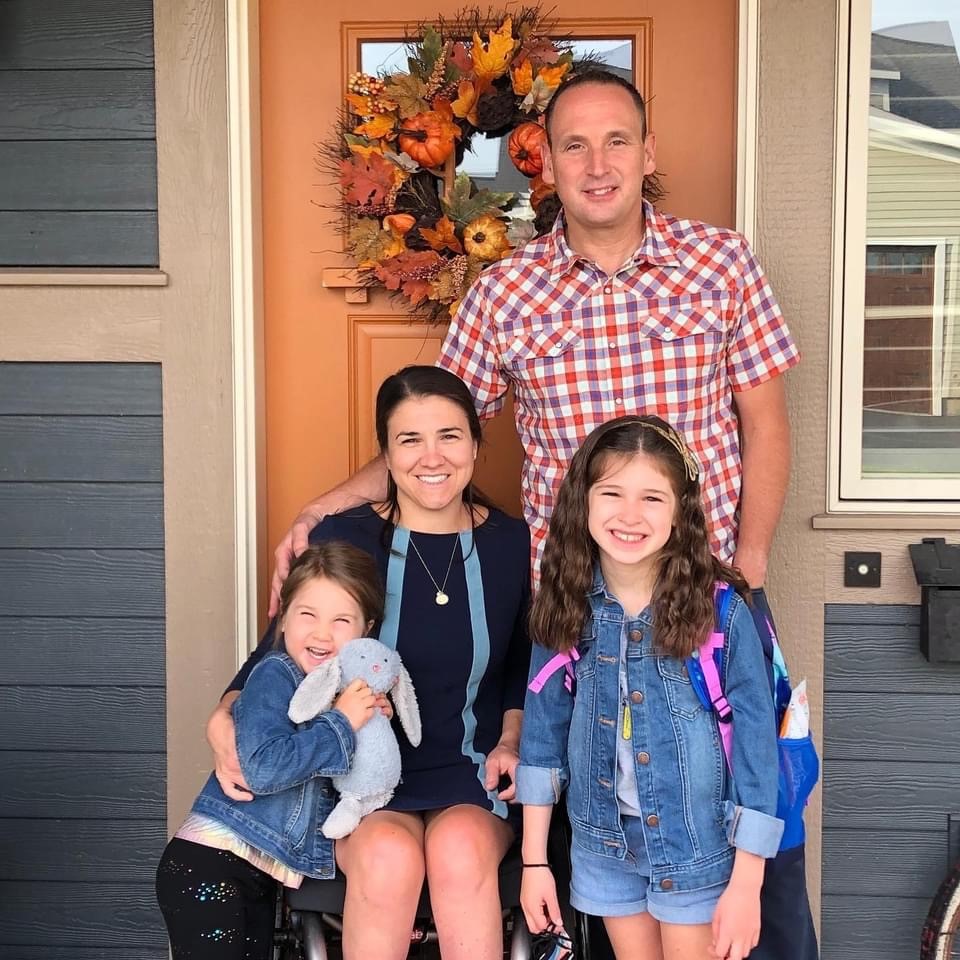
Ellie with her husband, Paul, and two daughters Lily & Etta.
Originally from Canton, New York, Ellie Komanecky’s path to working at Syracuse University’s Institute for Veterans and Military Families (IVMF) in many ways parallels the experience of many veterans she has worked with over the past ten years. Veterans in some cases are beginning a new chapter in their lives after sustaining a disabling injury. When Komanecky was a college student in 2004 her plans drastically changed when she sustained a spinal cord injury leaving her paralyzed from the waist down.
Komanecky began inpatient rehabilitation at Mount Sinai Hospital in New York City to help her get physically stronger and gain back her independence. She transferred to New York University to study business. While NYU’s campus was easier to navigate with her wheelchair, she still didn’t feel like it was a good fit. She struggled to relate with other college students and never felt at home. “I felt like I was at a different level maturity wise than a lot of these students,” she says. NYU’s business school’s programs were focused mainly on finance, and Komanecky didn’t see that as an attractive opportunity. “I started looking at Syracuse University and it had a great entrepreneurship program,” she says. “I saw that as an opportunity. You can be entrepreneurial in your career, and don’t necessarily need to start your own business.” As a second semester junior, she transferred to Syracuse University’s Whitman School of Management in 2007.
At Whitman she met Dr. Mike Haynie. Haynie was in the early stages of developing a program for veterans with disabilities. After becoming involved, she developed a personal connection to the program and participants based on her similar experience going through something traumatic and facing similar obstacles. In retrospect, she realizes now how similar of a situation she was in at the time. “You want to get your life back to normal, and accomplish the same life goals as other people, but now you are faced with more challenges and roadblocks to overcome,” she says.
Komanecky felt an instant affinity with veteran men and women interested in the independence of owning a business. “They want to get on with their life. And I felt like that was something I drew a connection to,” she says. Empowering veterans to find their own career and path was rewarding. After graduating in 2008, she worked as the program coordinator for the Entrepreneurship Bootcamp for Veterans. Komanecky continued that role when EBV and other veteran programs were brought together under one roof when IVMF was founded in 2011.
While working at IVMF she liked working on visual communication projects. She later took a course in graphic design and today works as a graphic artist. What she has learned working with veterans and their families at IVMF over the past decade is being okay with reinventing yourself. “There are things that are going to be different, and it is okay to take a different path to accomplish your goals. I think mentally that’s a big challenge, I know that was for me,” she says. “Once you can accept that and then move on, you’re open to all these new possibilities.”
Komanecky says she is proud to be a one of the first members of the IVMF team and continue to help veterans transition and find the confidence to reinvent themselves. “It is awesome to be a part of the IVMF and to see how we have evolved over the years,” she says. “I’m excited for what the future will bring.”
